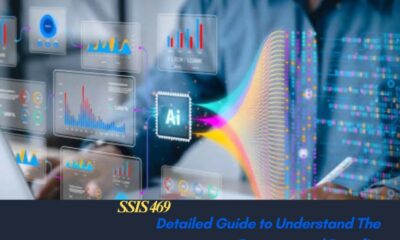Education
Geometry Spot – Best Way to Learn Mathematic By Playing Games

Geometry Spot is an ideal platform for math and geometry enthusiasts. Their articles cover a wide range of math topics and make geometry games available for learners. If you have ever thought of a platform where you can learn complex topics of math and geometry conveniently, then Geometry Spot should be the perfect spot for you. So, let’s explore the platform together.
What Is The Geometry Spot?
It is a digital learning platform that publishes informative content on geometry and math topics. The platform was launched in October 2022 and features over 30 articles. They have multiple other websites with the name Geometry Spot, so if the server of a website is down, users can access different websites. On this platform, you will find math tutorials, activities, and explanations of math concepts. They also have their own YouTube channel, where they post educational content. In addition to math and geometry games, other fun games are also available to play, making an ideal website to study and have fun.
How To Access The Geometry Spot Website?
To access this website, you need to follow these simple steps, they are as follows:
- Open any web browser and search for the term “Geometry Spot website.”
- Now, check the search results; the first website should be the official one.
- Otherwise, you can paste this URL “https://geometryspot.com/” into the web address bar and access the website.
Other Websites Of Geometry Spot
Geometry Spot is a comprehensive learning platform; they have maintained multiple platforms; their other platform URLs are:
- geometryspot.cc
- geometryspot.net
- geometryspot.school
- geometryspot.ooo
- geometryspot.us
If the first website with a .com domain is down or becomes inaccessible, you can visit these alternative websites. However, I haven’t visited them personally, but I have taken the list from their original website.
Features Of Geometry Spot
Geometry Spot platform is filled with useful features, a few of them are as follows:
User Support
The primary feature of Geometry Spot is its user support feature. Using this option, you can easily communicate any error or your message with the team. If players are facing any issues, they can send a message to the team with the specific game name and describe their problem in a particular “dialog box.”
Multiple Variety Of Games
The platform is filled with multiple games, including education and other fun category games, making it a complete game platform for everyone. The games are fun and easy to load on devices, so users can also play them on low-configuration devices.
No Need To Download Anything
Another feature of the Geometry Spot platform is that users are not required to download anything to access their website. They can use any suitable web browser to operate their platform. It helps devices with low storage to avoid burdening their storage space.
Easy To Load
The activities uploaded on the Geometry Spot platform are easy to load and don’t require a significant amount of data at high speed. A moderate internet speed would be enough to access this platform.
Conclusion
Today, everything is online, and we spend the majority of our time with digital devices doing useless activities. It is better to utilize the unproductive time and sharpen our math and geometry skills. The Player Geometry Spot is a comprehensive learning platform that provides educational content and games for effective learning. As we have covered details about the platform, if you like reading this post and find it helpful, then do share it with others as well.
Frequently Asked Questions (FAQs)
Is Geometry Spot A Safe Learning Platform?
Well! The platform seems safe to me with its minimal ads and other valuable features. However, it is always better not to trust any platform completely and to read its policies to learn about its operations.
How To Avoid Addiction Of Online Gaming?
Everything is good in moderation. Even if you play educational games for hours, instead of benefiting your health, it will damage your eyes and affect your mental health as well. Play in moderation and take full advantage.
Education
How Technology Makes School Testing Easier

In today’s fast-paced educational landscape, technology has become a crucial tool for simplifying school testing. From automated test administration to real-time feedback, modern solutions are making it easier for teachers to manage assessments and support student learning. Here’s how technology is revolutionising the way schools approach testing.
Streamlining Test Administration
One of the most significant ways technology has transformed school testing is by streamlining test administration. Instead of printing and distributing paper-based exams, schools can now use an online platform for running school tests. These platforms offer a centralised space for creating, distributing, and managing assessments, saving time and reducing administrative burdens.
Automated scheduling and notifications ensure that students receive timely reminders about upcoming tests, minimising the risk of missed exams. Additionally, these platforms often support multiple test formats—such as multiple-choice, short answer, and essay questions—allowing for greater flexibility in assessment design.
Simplifying Remote and Hybrid Testing
With the rise of blended and remote learning, technology has made it possible to conduct tests from virtually anywhere. Online platforms offer secure, proctored testing options to ensure academic integrity, even when students are not physically present in a classroom. Online proctoring, initially adopted as a short-term solution, has the potential to enhance flexibility and accessibility in higher education, according to SAGE Journals. This flexibility allows schools to continue assessments without disruption, regardless of the learning environment.
Many platforms also support integration with video conferencing tools and other collaboration software, creating a seamless testing experience for students and teachers alike.
Enhancing Accessibility and Inclusivity
Technology also plays a critical role in making testing more accessible. Online platforms often come with features such as text-to-speech, font adjustments, and colour contrast settings, which help accommodate students with diverse learning needs. These adaptations ensure that all students can participate in assessments on an equal footing.
Moreover, online testing platforms can provide adaptive testing, where the difficulty of questions adjusts based on the student’s performance. This approach not only provides a more accurate measure of a student’s abilities but also helps build confidence by ensuring they are not overwhelmed by overly difficult questions.
Real-Time Feedback and Automated Grading
One of the most powerful benefits of technology is its ability to deliver real-time feedback. Online testing platforms often provide instant results for multiple-choice and similar question formats, allowing students to see their scores immediately after completing an assessment. This immediate feedback helps students identify areas for improvement and encourages self-directed learning.
Automated grading systems also reduce the workload for teachers, freeing up more time for personalised instruction. For open-ended questions, some platforms even use natural language processing (NLP) to assist with grading, ensuring consistency and fairness.
Data-Driven Insights for Better Decision-Making
Technology doesn’t just make testing easier—it also provides valuable insights into student performance. By analysing test data, teachers can identify trends, pinpoint knowledge gaps, and adjust their teaching strategies accordingly. For instance, if a large number of students struggle with a particular topic, teachers can revisit the material or offer additional support.
Advanced reporting features also allow for group performance comparisons and longitudinal tracking, helping educators monitor progress over time. These insights empower teachers to make data-driven decisions that enhance learning outcomes for all students.
Supporting Personalised Learning Paths
Finally, technology enables schools to create personalised learning paths based on assessment results. By using data to identify individual strengths and weaknesses, educators can tailor instruction to meet the unique needs of each student. This approach not only fosters deeper learning but also helps build a growth mindset by encouraging students to take ownership of their learning journey.
A More Efficient Testing
Technology has made school testing more efficient, inclusive, and insightful than ever before. From streamlining test administration to providing real-time feedback and data-driven insights, modern solutions are transforming how schools approach assessments.
By leveraging online platforms, educational institutions can simplify the entire testing process, freeing up time for teachers to focus on what matters most—supporting student learning. As technology continues to evolve, schools that embrace these innovations will be better equipped to foster academic success in every student.
Education
How Education Helps Build Essential Project Management Skills

In today’s fast-paced industries, robust project management capabilities are no longer optional but essential. The right academic foundation plays a significant role in helping individuals develop the expertise to manage complex tasks, make informed decisions, and collaborate effectively with teams. Educational programs tailored to specific sectors provide knowledge in core areas and teach critical skills like logistics planning and resource optimization. These programs offer a structured path to mastering the art of managing projects, ensuring professionals can meet the demands of an ever-evolving market.
Here are some ways educational programs can help strengthen your management skills:
The Role of Education in Skill Development
Formal training lays the groundwork for success in project management. It introduces essential concepts like risk assessment, resource allocation, and stakeholder engagement. By participating in structured programs, individuals gain exposure to case studies, group projects, and real-world applications, which are critical for understanding the complexities of modern industries. This hands-on experience helps bridge the gap between theoretical learning and practical execution.
Leadership Skills Fostered by Training
Developing strong interpersonal capabilities is an essential aspect of project management. Formal instruction often includes leadership development courses, which help individuals learn how to inspire and motivate teams while fostering collaboration. Effective leaders understand how to manage diverse groups, resolve conflicts, and communicate clearly. These qualities are essential in ensuring projects stay on track and objectives are met. Moreover, programs focusing on leadership provide frameworks for navigating the challenges of managing team dynamics in high-pressure situations.
Strategic Planning in Project Management
Strategic planning forms the backbone of effective project management, allowing individuals to identify goals, set priorities, and allocate resources efficiently. Specialized programs, such as an online MBA in supply chain management, delve deep into strategies tailored to industries that require a meticulous approach to operations. Students explore critical topics like demand forecasting, inventory optimization, and global logistics, equipping them to handle large-scale projects with precision. These programs emphasize operational efficiency and the importance of aligning strategies with organizational objectives, preparing individuals for complex decision-making in competitive markets.
Time Management and Prioritization Techniques
Efficient time management is vital for delivering successful projects. Training programs often incorporate methods to prioritize tasks, break down goals into manageable steps, and adhere to strict deadlines. Students learn to create timelines and schedules that keep projects moving forward, even when challenges arise. By mastering these techniques, individuals can juggle multiple responsibilities while maintaining productivity and quality outcomes. Time management is not just about working faster; it’s about working smarter and focusing efforts where they matter most.
Problem-Solving and Critical Thinking
The ability to analyze situations and devise effective solutions is a cornerstone of project management. Academic programs emphasize critical thinking by exposing students to complex scenarios that require innovative approaches. Case studies and real-world simulations help participants build the confidence to tackle unexpected challenges. Problem-solving is not just about fixing immediate issues; it’s about identifying root causes and implementing solutions that prevent future obstacles. This systematic approach enables managers to guide their teams through uncertainty while ensuring the success of their projects.
Data-Driven Decision Making
Data is the foundation of effective decision-making in today’s project management landscape. Academic programs provide students with tools and techniques to analyze data, interpret trends, and make informed choices. For instance, courses often focus on statistical methods, forecasting, and financial modeling, which are invaluable for project planning. By learning to evaluate metrics like cost-effectiveness and risk probabilities, individuals can make sound decisions that align with organizational goals. The ability to harness data enhances efficiency and builds credibility in a project manager’s decision-making process.
Financial Management and Budgeting
A strong grasp of financial principles is essential for managing project budgets effectively. Academic training introduces key concepts such as cost analysis, budget allocation, and financial forecasting. These skills enable project managers to allocate resources wisely and ensure projects stay within financial limits. Programs also emphasize the importance of tracking expenses and adjusting budgets in response to changing circumstances. Mastering financial management allows individuals to execute projects without unnecessary delays or cost overruns, making them invaluable assets to their teams.
Improving Communication and Collaboration
Clear communication is critical for ensuring everyone involved in a project understands their roles and responsibilities. Academic programs often include training in effective communication techniques, such as creating concise project plans, delivering impactful presentations, and writing detailed progress reports. Collaboration is equally emphasized, with group assignments and workshops designed to teach the art of teamwork. By learning to navigate diverse perspectives and resolve misunderstandings, individuals develop the interpersonal skills needed to manage stakeholders, guide teams, and foster a productive work environment.
Adapting to Emerging Trends and Technologies
The modern workplace is constantly evolving, and project managers must stay ahead of emerging trends. Educational programs provide insights into the latest tools and technologies shaping the industry, such as automation, artificial intelligence, and sustainability practices. These courses help students understand how to incorporate these advancements into their workflows, improving efficiency and innovation. Staying updated on technological advancements ensures that managers remain competitive and capable of leading projects in an ever-changing environment.
Education plays a vital role in equipping individuals with the essential skills needed for project management success. From strategic planning and financial management to communication and technological adaptation, academic programs provide a comprehensive foundation for managing complex projects. By pursuing educational opportunities and committing to continuous learning, individuals can build the expertise required to navigate challenges, lead teams effectively, and drive meaningful results in their projects.
Education
The Perks of Pursuing an Advanced Degree Program for Skill Enhancement

In today’s fast-paced job market, the quest for skill enhancement has become more crucial than ever. Individuals seeking to stand out among a sea of candidates often turn to advanced degree programs as a strategic move to boost their careers.
Whether you’re contemplating whether it’s worth the investment or curious about the benefits, pursuing an advanced degree offers significant opportunities that can shape your professional and personal life for years to come.
Why Choose an Advanced Degree for Skill Enhancement?
Getting an advanced degree can help you get better jobs. Many high-level positions, like managers or specialists, prefer people with more education.
People with advanced degrees usually earn more money than those with only a bachelor’s degree.
Having more education also means learning more about a subject. This can make someone an expert in their field, leading to more exciting and satisfying work.
Personal Growth Through Education
Getting an advanced degree isn’t just about a better job. It also helps you grow as a person. It teaches you to think in new ways, solve tough problems, and work well with others.
You learn from classmates with different ideas and backgrounds. This helps you see things from new perspectives.
It also builds important skills like communication, teamwork, and understanding others. These are the things that are useful in any job.
Networking Opportunities
An advanced degree also helps you meet important people in your field. Students connect with classmates, teachers, and professionals, building a strong network.
These connections can lead to mentors, internships, and job opportunities. Joining alumni groups also helps professionals stay updated and find new chances to grow.
Exploring Degree Options
When it comes to advanced degrees, the choice often lies between a Master of Science vs. Master of Arts. Each program offers distinct advantages aimed at different career paths.
A Master of Science typically focuses on technical subjects and practical applications. This is ideal for fields such as engineering, data science, and healthcare.
In contrast, a Master of Arts generally emphasizes social sciences and humanities. This makes it suitable for those in education, psychology, or communication.
This distinction highlights the importance of aligning one’s choice of degree with career goals. Understanding the nuances of these programs can guide individuals toward the best option for their personal and professional aspirations.
The Road Ahead: Making the Decision
Choosing to get an advanced degree is a big decision. It takes time, money, and effort, so it’s important to think carefully.
But the benefits such as learning new skills, growing in your career, and personal development can make it all worth it.
Think about your goals and what you want to learn. Talking to experts or teachers can help you decide. In the end, an advanced degree can open doors and improve your future.
Embrace the Journey
Pursuing an advanced degree is a transformative experience that provides significant rewards in skill enhancement, career advancement, and personal growth. As the demand for specialized skills continues to rise, investing in your education can set you apart in the competitive job market.
Take the first step toward your future today by exploring available programs. Find the one that aligns with your ambitions.
For more skills and learning tips, check out our blog posts.
-

 Entertainment11 months ago
Entertainment11 months agoBest Kickass Proxy List 2024 – 100% Working to Unblock to Access
-

 Lifestyle11 months ago
Lifestyle11 months agoBanging The Underdog Incident 2022
-

 Entertainment11 months ago
Entertainment11 months agoTamilMV Proxy Sites List 2025 – How to Unblock TamilMV Safely?
-

 Entertainment11 months ago
Entertainment11 months agoTamilRockers Proxy 2025: 20+ Working Links, Mirror Sites & VPN Guide
-

 Fashion9 months ago
Fashion9 months agoTrendy Midi Dresses for Casual Wear: Hair Care Tips Included!
-

 Entertainment11 months ago
Entertainment11 months agoPirate Bay Proxy List 2025: Access The Pirate Bay Safely
-

 Technology8 months ago
Technology8 months agoSSIS 469 – Detailed Guide to Understand The Features and Benefits
-

 Blog9 months ago
Blog9 months agoCy Kass – Family Detail of Alex Wagner and Sam Kass




